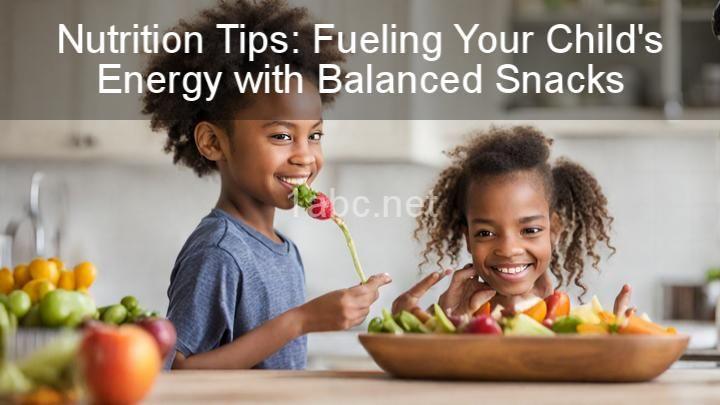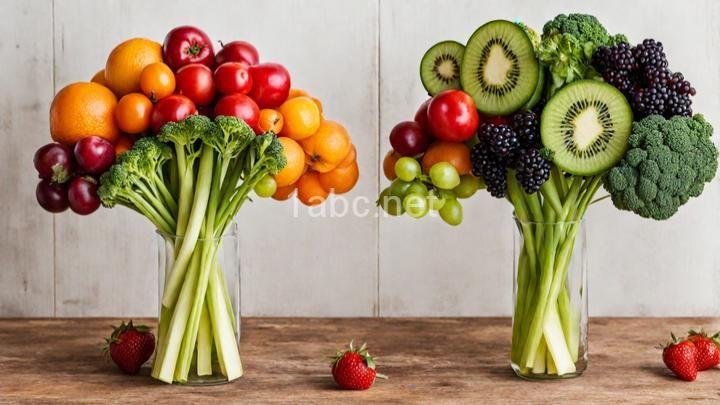Nutrition Tips: Fueling Your Child's Energy with Balanced Snacks

Introduction:
Welcome, parents! Today, we're sharing some friendly nutrition tips to help you fuel your child's energy levels with delicious and balanced snacks. Ensuring that your little ones have the right nutrients is essential for their growth and overall well-being.
I. Understanding the Importance of Balanced Snacks
Snacks play a crucial role in providing energy boosts throughout the day for children. Kids have smaller stomachs and higher metabolisms, making them more prone to hunger between meals. By incorporating balanced snacks into their diet, you can help them maintain stable energy levels and avoid unhealthy cravings.
When it comes to balanced snacks, it's important to remember the three macronutrients: carbohydrates, proteins, and healthy fats. Each of these nutrients plays a vital role in providing sustained energy and supporting your child's overall growth and development.
Carbohydrates are the body's primary source of energy. They provide quick energy and help maintain stable blood sugar levels. Incorporating complex carbohydrates, such as whole grains, fruits, and vegetables, into your child's snacks can keep them feeling fuller for longer and provide a steady release of energy.
Proteins are essential for muscle repair and growth. Including protein-rich options in your child's snacks can help them feel satisfied and promote healthy development. Lean meats like turkey slices or grilled chicken strips are great options, as well as plant-based alternatives like hummus or nut butter spreads.
Healthy fats are important for brain development and overall health. Incorporating sources of good fats, such as avocados, nuts, and olive oil, into your child's snacks can provide essential nutrients and promote satiety.
II. Building a Healthy Snack Foundation
To create a foundation of healthy snacks for your child, it's important to incorporate fruits and vegetables as the base of every snack. Fresh or frozen options are preferred over processed alternatives, as they provide more nutrients and have fewer added sugars and preservatives. Offering a variety of colors ensures that your child receives a wide range of vitamins, minerals, and antioxidants.
In addition to fruits and vegetables, whole grains should also be included in your child's snacks. Whole grains provide fiber, which aids in digestion and helps maintain stable blood sugar levels. Opt for whole-grain crackers, bread, or cereal bars instead of refined grain options that lack beneficial fiber content.
III. Adding Protein Power to Snacks
Protein is an essential nutrient for children, as it supports their growth, repairs tissues, and boosts their immune system. Including protein-rich options in your child's snacks can help them feel full and satisfied.
Lean meats, such as turkey slices or grilled chicken strips, are excellent sources of protein. They can be included in sandwiches, wraps, or as a side with other snack options. Plant-based alternatives like hummus or nut butter spreads are also great sources of protein and can be paired with fruits, vegetables, or whole-grain crackers.
Dairy products, such as yogurt cups, cheese sticks, or cottage cheese, are convenient sources of protein that can be easily incorporated into your child's snacks. They provide calcium and other essential nutrients necessary for healthy bone development.
IV. Including Healthy Fats in Snack Selections
Contrary to popular belief, not all fats are bad for you. In fact, healthy fats are essential for your child's growth and development. Incorporating good fats into their diet can support brain function, enhance absorption of fat-soluble vitamins, and provide long-lasting energy.
Omega-3 fatty acids are particularly beneficial for brain health. Foods like avocados, nuts, and seeds are rich sources of omega-3s and can be included in your child's snacks. Consider incorporating these ingredients into homemade trail mix or pairing them with fruits or vegetables for a balanced snack.
Natural sources of fats, such as olive oil or nut oils, can also be used in preparing homemade snacks. These oils add flavor and provide essential nutrients to your child's diet. Use them for baking, sautéing, or drizzling over snacks like roasted vegetables or whole-grain crackers.
V. Fun and Creative Snack Ideas
Making snacks fun and appealing can encourage your child to develop healthy eating habits. Here are some imaginative and delicious snack ideas:
- Fruit kebabs with yogurt dip: Thread colorful fruits like strawberries, grapes, and melon onto skewers and serve with a side of yogurt dip for added protein.
- Veggie wraps with hummus spread: Fill whole-grain wraps with an assortment of colorful vegetables like carrots, cucumber, and bell peppers. Add a spread of hummus for protein and extra flavor.
- Homemade trail mix with nuts, seeds, and dried fruits: Create a custom trail mix by combining a variety of nuts, seeds, and dried fruits. This snack is not only delicious but also provides a good balance of carbohydrates, proteins, and healthy fats.
Conclusion:
By following these friendly nutrition tips, you can ensure that your child's energy is fueled by balanced snacks throughout the day. Remember to make snacking both tasty and nutritious, inspiring your little ones to develop healthy eating habits that will benefit them for years to come! With a well-rounded snack foundation, including fruits, vegetables, whole grains, protein sources, and healthy fats, you can provide your child with the nutrients they need for growth, development, and optimal energy levels.
FREQUENTLY ASKED QUESTIONS
What are balanced snacks?
Balanced snacks are snacks that provide a combination of nutrients including protein, healthy fats, and carbohydrates, as well as vitamins and minerals. These snacks help maintain a steady release of energy, keep you feeling fuller for longer, and provide a balanced intake of essential nutrients. Some examples of balanced snacks include a handful of nuts and seeds, Greek yogurt with fruits, whole grain crackers with hummus, or a small apple with peanut butter.
Why is it important to provide balanced snacks for children?
Providing balanced snacks for children is important for several reasons:
- Nutritional needs: Balanced snacks help meet the nutritional needs of growing children. Children require a variety of nutrients, including carbohydrates, proteins, healthy fats, vitamins, and minerals, to support their physical and cognitive development.
- Energy and concentration: Balanced snacks provide a steady source of energy, helping children avoid blood sugar spikes and crashes. This can support their ability to concentrate and perform well in school and other activities.
- Sustained hunger control: Balanced snacks, such as those that include protein and fiber, help keep children feeling fuller for longer. This can prevent excessive snacking on unhealthy options and overeating during meals.
- Health and well-being: Providing balanced snacks can help promote good overall health and well-being in children. A diet consisting of junk or sugary foods can lead to weight gain, poor dental health, nutritional deficiencies, and an increased risk of chronic diseases later in life.
- Establishing healthy eating habits: Introducing children to balanced snacks at an early age can help them develop healthy eating habits that can last a lifetime. It sets them up for understanding the importance of a nutritious diet and making better food choices as they grow older.
By offering balanced snacks, parents and caregivers play a crucial role in promoting the health and well-being of children, supporting their growth and development, and setting them up for a lifetime of healthy eating habits.
How can balanced snacks help fuel my child's energy?
Balanced snacks play a crucial role in fueling your child's energy levels. Here's how they can help:
- Nutrient-rich: Balanced snacks contain a mix of macronutrients like carbohydrates, proteins, and healthy fats, as well as essential vitamins and minerals. These nutrients provide energy and support optimal growth and development.
- Sustained energy release: Snacks that combine complex carbohydrates with proteins or fats provide a steady release of energy. This helps prevent quick energy crashes and keeps your child's energy levels stable throughout the day.
- Improved focus and concentration: When children have regular balanced snacks, their blood sugar levels remain steady. This steady blood sugar helps maintain focus and concentration, enabling them to perform better academically and during physical activities.
- Enhance growth and development: Balanced snacks contribute to the overall growth and development of your child's body and brain. Essential nutrients like calcium, iron, zinc, and vitamins support bone development, immune function, cognitive abilities, and more.
To ensure the snacks are balanced, include a variety of food groups such as fruits, vegetables, whole grains, lean proteins, and healthy fats. This diversity will help provide a wide range of nutrients and support your child's energy needs throughout the day.
What should be included in a balanced snack?
A balanced snack typically includes a combination of macronutrients, such as carbohydrates, protein, and healthy fats, along with some fiber. Here's a general guideline on what to include in a balanced snack:
- Carbohydrates: Opt for complex carbohydrates that provide sustained energy. Examples include whole grains, fruits, and vegetables.
- Protein: Protein helps keep you feeling full and satisfied. Good sources include nuts, seeds, legumes, Greek yogurt, and lean meats.
- Healthy Fats: Include sources of healthy fats like avocados, nuts, seeds, or nut butter. They provide satiety and support brain health.
- Fiber: Fiber aids digestion and helps you feel full longer. Choose snacks with high fiber content, such as whole fruits, vegetables, or whole grain products.
Remember to keep portion sizes in check to avoid excessive calorie intake. A balanced snack provides both nourishment and satisfaction!



